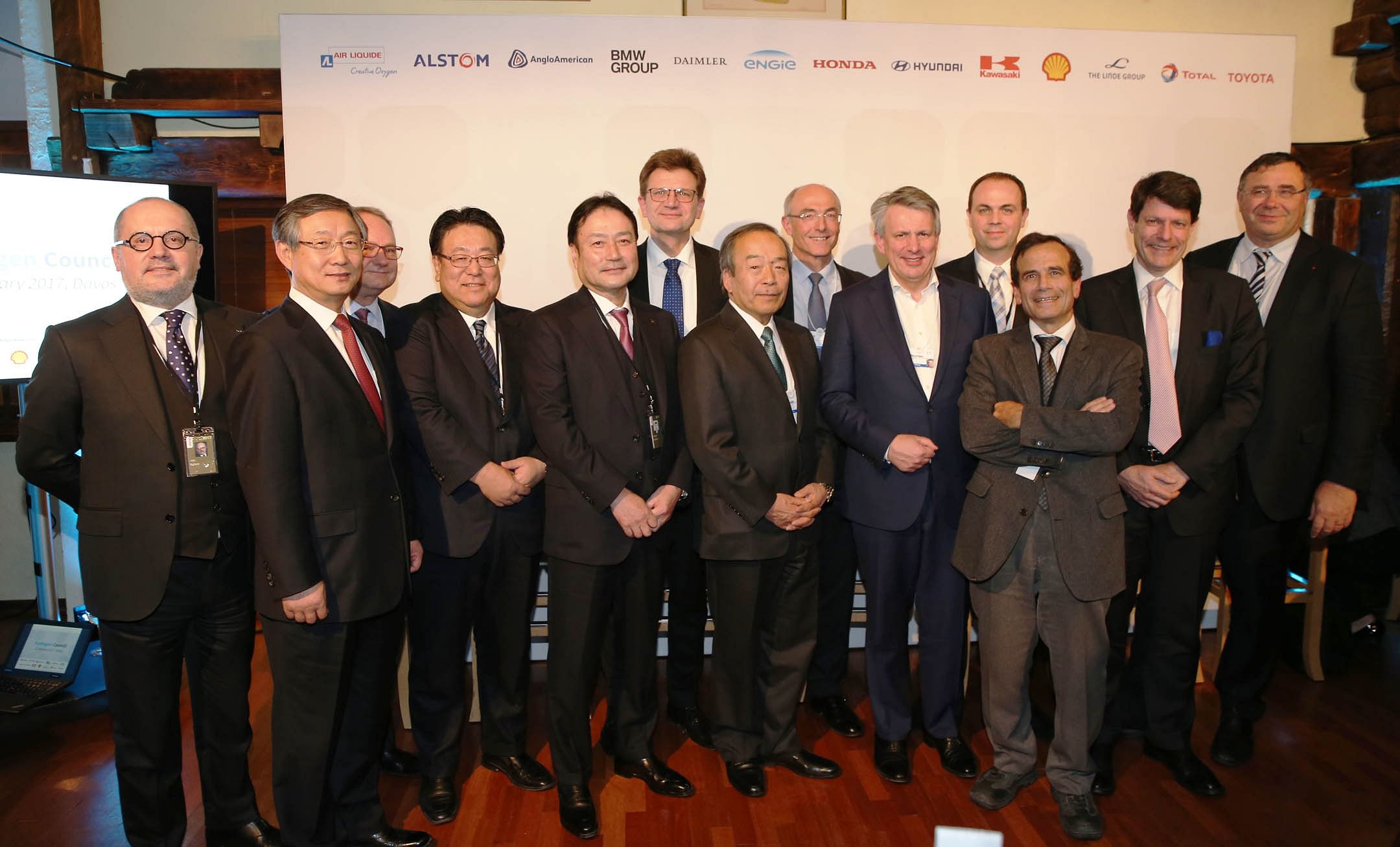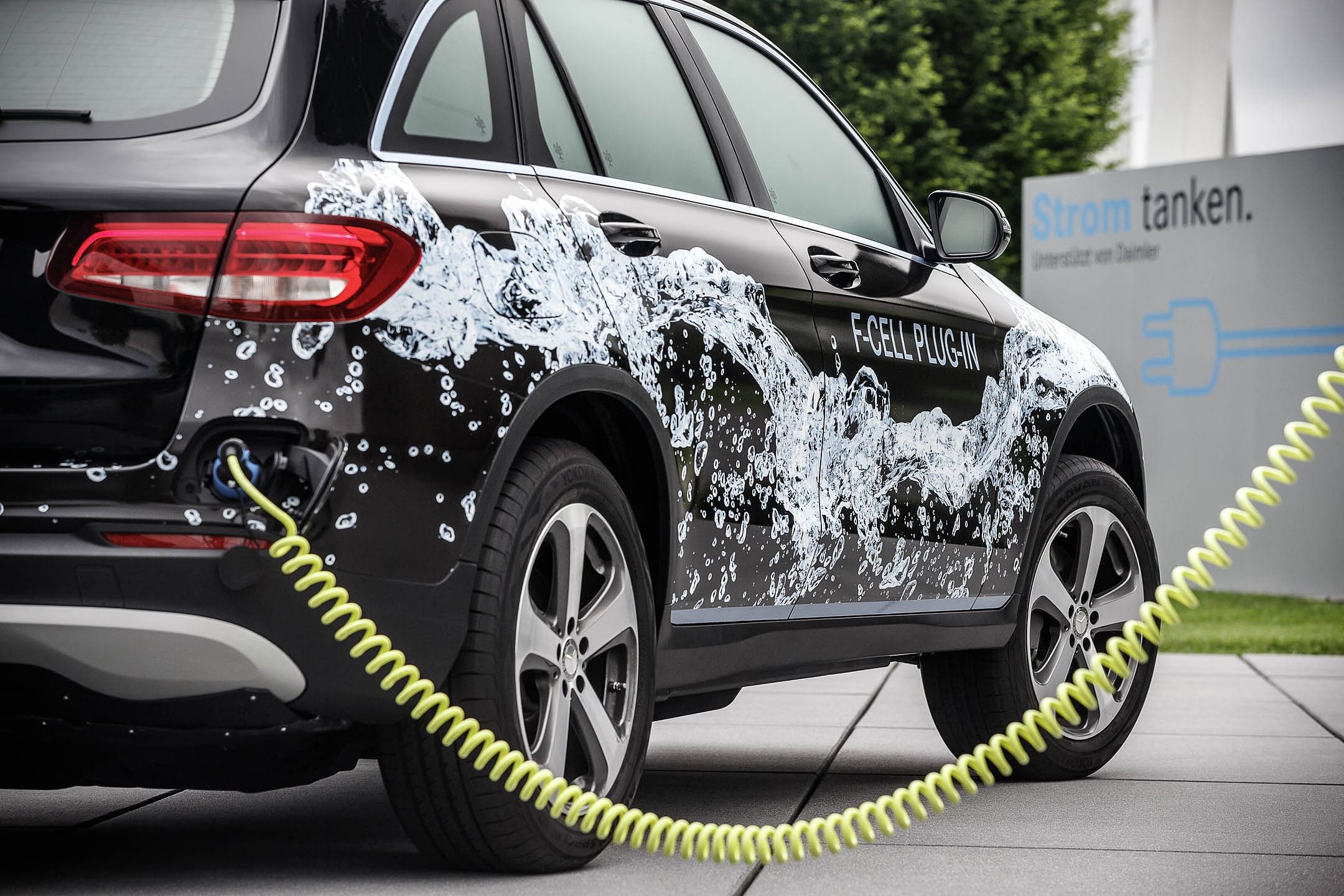BMW, Daimler, Honda, Hyundai and Toyota in 13-member global hydrogen energy initiative
Following their meeting in Davos on January 17, the 13 companies have committed to help achieve the ambitious goal of reaching the 2deg Celsius target as agreed in the 2015 Paris Agreement.
Thirteen leading energy, transport and industry companies, including five leading automakers, have launched a global initiative to voice a united vision and long-term ambition for hydrogen to foster the energy transition.
In the first global initiative of its kind, the ‘Hydrogen Council’ is determined to position hydrogen among the key solutions of the energy transition. Hydrogen is a versatile energy carrier with favourable characteristics since it does not release any CO2 at the point of use as a clean fuel or energy source, and can play an important role in the transition to a clean, low-carbon, energy system. Hydrogen technologies and products have significantly progressed in recent years and are now being introduced to the market. The Council will work with, and provide recommendations to, a number of key stakeholders such as policy makers, business and hydrogen players, international agencies and civil society to achieve these goals.

L-R: Professor Dr Aldo Belloni, CEO, Linde Group Linde; Woongchul Yang, vice-chairman, Hyundai; Mark Cutifani, CEO, Anglo American; Seiji Kuraishi, executive vice-president, executive officer and representative director, Honda; Yoshinori Kanehana, CEO, Kawasaki; Klaus Fröhlich, Member of the Board of Management of BMW Group Development; Takeshi Uchiyamada, chairman, Toyota; Benoit Potier, CEO, Air Liquide; Ben van Beurden, CEO, Shell; Jochen Hermann, vice-president, Daimler; Didier Holleaux, executive vice-president, Engie; Thierry Best, COO, Alstom; and Patrick Pouyanné, chairman of the Board and CEO, Total.
Meeting in Davos for the first time on January 17, the Hydrogen Council is currently made up of 13 CEOs and chairpersons from various industries and energy companies committed to help achieve the ambitious goal of reaching the 2deg Celsius target as agreed in the 2015 Paris Agreement. The international companies currently involved are: Air Liquide, Alstom, Anglo American, BMW Group, Daimler, Engie, Honda, Hyundai Motor, Kawasaki, Royal Dutch Shell, The Linde Group, Total and Toyota. The Council is led by two co-chairs from different geographies and sectors, currently represented by Air Liquide and Toyota.
The members of the Hydrogen Council collectively represent total revenues of 1.07 trillion euros (Rs 8,179,080 crore) and 1.72 million employees around the world.
To accelerate investment in hydrogen eco-system
During the launch, members of the ‘Hydrogen Council’ confirmed their ambition to accelerate their significant investment in the development and commercialisation of the hydrogen and fuel cell sectors. These investments currently amount to an estimated total value of 1.4 billion euros (Rs 10,701 crore) a year. This acceleration will be possible if the key stakeholders increase their backing of hydrogen as part of the future energy mix with appropriate policies and supporting schemes.
“The 2015 Paris Agreement to combat climate change is a significant step in the right direction but requires business action to be taken to make such a pledge a reality. The Hydrogen Council brings together some of the world’s leading industrial, automotive and energy companies with a clear ambition to explain why hydrogen emerges among the key solutions for the energy transition, in the mobility as well as in the power, industrial and residential sectors, and therefore requires the development of new strategies at a scale to support this. But we cannot do it alone. We need governments to back hydrogen with actions of their own – for example through large-scale infrastructure investment schemes. Our call today to world leaders is to commit to hydrogen so that together we can meet our shared climate ambitions and give further traction to the emerging hydrogen ecosystem,” said Benoît Potier, CEO, Air Liquide.
"The Hydrogen Council will exhibit responsible leadership in showcasing hydrogen technology and its benefits to the world. It will seek collaboration, cooperation and understanding from governments, industry and most importantly, the public. At Toyota, we have always tried to play a leading role in environmental and technological advances in the automotive industry, including through the introduction of fuel cell vehicles. Moreover, we know that in addition to transportation, hydrogen has the potential to support our transition to a low carbon society across multiple industries and the entire value chain. The Hydrogen Council aims to actively encourage this transition,” commented Takeshi Uchiyamada, chairman, Toyota.

Above: Mercedes-Benz GLC F-Cell prototype. Not only can the GLC F-Cell be refuelled with hydrogen in under 3 minutes at an appropriate filling station but convenient external charging of its high-voltage battery is also possible.
“Zero emission technologies are an integral part of Daimler's powertrain strategy. Besides plug-in-hybrids and vehicles equipped with 48-volt-systems our portfolio will feature more than ten fully electric vehicles in the passenger car segment alone by 2025. Fuel cell technology has a huge potential for the energy and mobility sector. The benefits for us are obvious: a long operating range and short refuelling stops as well as a broad spectrum of possible uses ranging from passenger cars to urban buses. We strongly continue to pursue our goal of bringing the next generation fuel cell electric vehicles on the market. We will unveil the Mercedes-Benz GLC F-Cell this year,” said Jochen Hermann, vice-president, Electrics/Electronics & E-Drive Development at Daimler AG.
A report entitled ‘How Hydrogen empowers the energy transition’, commissioned by the Hydrogen Council, further details this future potential that hydrogen is ready to provide, and sets out the vision of the Council and the key actions it considers fundamental for policy makers to implement, to fully unlock and empower the contribution of hydrogen to the energy transition.
.
RELATED ARTICLES
Autoliv Plans JV for Advanced Safety Electronics With China’s HSAE
The new joint venture, which is to be located strategically near Shanghai and close to several existing Autoliv sites in...
JLR to Restart Production Over a Month After September Hacking
Manufacturing operations at the Tata Group-owned British luxury car and SUV manufacturer were shut down following a cybe...
BYD UK Sales Jump 880% in September to 11,271 units
Sales record sets the UK apart as the largest international market for BYD outside of China for the first time. The Seal...






 By Autocar Professional Bureau
By Autocar Professional Bureau
 19 Jan 2017
19 Jan 2017
 5569 Views
5569 Views





 Ajit Dalvi
Ajit Dalvi




